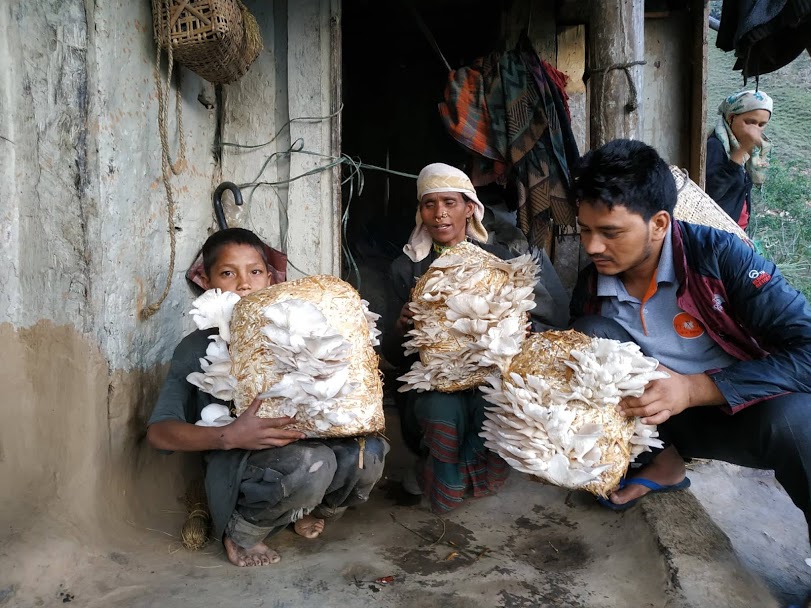Women in Nepal are growing mushrooms to improve nutrition and generate income. Packed full of proteins, fibre, vitamins and minerals, mushrooms hold incredible nutritional value. Mushroom cultivation has the potential to address issues of extreme poverty and malnutrition in Nepal, as well as provide a sustainable source of income for families.
Mushrooms are classified as vegetables in the food world, but they are not technically plants. They belong to the fungi kingdom. Despite them not being vegetables, mushrooms are packed full of essential vitamins and minerals including potassium, calcium, magnesium and iron. Their high protein and fibre content make them a great alternative to meat.

Malnutrition in Nepal is extremely high. 1.7 million children in Nepal currently suffer from at least one form of malnutrition (WHO, 2018). PHASE Worldwide incorporates nutrition into our primary healthcare provision as well as runs integrated programmes to address the root causes of malnutrition. Recently, we have been supporting mushroom cultivation as part of our livelihoods work in Sindhupalchok and Mugu. By growing mushrooms, communities can greatly improve their nutritional intake and tackle malnutrition.
How to Grow Mushrooms
Growing mushrooms is cost-effective and easy to do. The process requires mushroom spawn; a substrate or growing medium (something the spawn can grow into); and a warm, damp and dark environment. Whilst mushroom spawn is more difficult to source, substrate is found in abundance for cultivators living in rural areas. Common mushroom-growing substrates include roots, straw and agricultural waste products. The substrate is inoculated with spawn and placed somewhere warm and dark, such as a barn or a shed, where it receives periodic dampening. The mild seasonal temperatures in the Far West regions of Nepal create an ideal climate for growing mushrooms. The whole process involves very few inputs, allowing for mushrooms to be cultivated continuously alongside traditional crop farming.
Where we come in
The nutritional and financial value of mushrooms is becoming increasingly recognised. PHASE Worldwide are currently the only NGO supporting mushroom cultivation in the Far West of Nepal through our Addressing Causes of Malnutrition programme, funded by the Department for International Development (DFID), which recently came to the end of its first year. A recent article on the challenges to mushroom cultivation in Nepal has reported that insufficient investment; poor quality of mushroom spawn; outdated technology; and poor harvest management is preventing rural farmers from unlocking the true potential of mushroom cultivation.

We provide training and education on mushroom cultivation delivered by a team of agricultural experts who support new mushroom cultivators in producing their first yield. PHASE Worldwide also purchases, transports and distributes mushroom spawn among our communities. The training is particularly relevant for female farmers who have previously been enrolled in PHASE Worldwide supported farmers’ groups. We train female to establish mushroom colonies for continuous mushroom harvesting, all year round.
Outcomes
PHASE Worldwide supported mushroom cultivation has already started to show encouraging results. Female farmers, who often don’t have access to large areas of land for growing crops, can now produce large mushroom yields in smaller spaces, utilising vertical growing techniques and making use of existing resources.
This has empowered female farmers, giving them independence over the way they grow their own food and provide for their families. By supporting them with the knowledge and resources to grow their own mushrooms, female farmers are now able to provide a healthy and nutritious diet for their families. The ability to grow mushrooms quickly and easily has also benefited other community members who can now buy any excess mushrooms, improving community nutrition whilst supplementing the cultivator’s income.
Mushroom cultivation is a good investment, as it offers an extremely high yield to cost ratio. Many farmers are able to make a profit up to four times their initial investment. The cost of setting up one small-scale mushroom farm (yielding up to 50 kilograms of mushrooms per harvest) is 1000 NPR (7 GBP). These can then be sold on at 200 NPR (1.4 GBP) per kilogram. Bachkali, a mushroom and vegetable farmer in Far West Nepal expresses how “(her) family members are amazed at how, using the right techniques, (they) only need rice straw and seeds to grow lots of nutritious mushrooms.”
A Productive Future
The achievements and positive results from mushroom cultivation are becoming increasingly recognised in the international development sector. Alongside our other health and livelihoods programmes, mushroom cultivation is fast becoming one of the most effective tools for tackling malnutrition in remote communities. PHASE Worldwide and PHASE Nepal have recently been recognised by the UK Government for our contribution towards SDG 2: Zero Hunger.

However, it is the personal achievements that make these projects so worthwhile. Stories of people like Bachkali, who has received support for vegetable growing and mushroom cultivation. She is now able to not only produce nutritious vegetables for her family and provide a steady income and become independent. On this, she writes:
“I have gained respect and trust from my family and locality as a ‘role model’ woman”.



